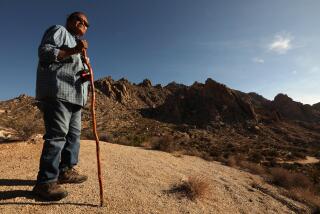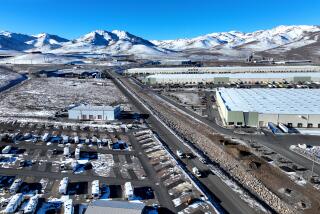Towns Do Battle: Which Was First?
- Share via
GENOA, Nev. — Everybody agrees Nevada’s birthplace will celebrate its 150th anniversary this spring. The disagreement is over where to hold the party.
Will the authentic sesquicentennial be celebrated in Genoa or at a competing event 25 miles away in Dayton? Don’t ask the towns’ residents.
The rivalry over bragging rights as the state’s first permanent white settlement dates to the mid-1800s when Nevada was dotted with tiny desert outposts.
Museums in both towns pass out brochures to confused visitors claiming their community was the first. Road signs in Genoa proclaim it No. 1, while a message on Dayton’s water tank stakes its claim.
The dispute has been passed from one generation to the next and stirs passionate argument.
“We’ve gone around and around on it, but I really think we were first,” said Billie Rightmire, 68, a fourth-generation Genoan whose great-grandfather moved there in 1858. “It’s something that’s always been a source of pride for us.”
Them’s fighting words for fourth-generation Daytonite Ray Walmsley, 75.
“I firmly believe we came first,” he said. “I got that information from my dad, and he got it from my great-grandfathers,” both of whom arrived in Dayton in 1859.
The dispute generates such strong emotions that State Archivist Guy Rocha felt threatened after tossing his valued support behind Dayton a couple years ago.
“Some people in Genoa were so angry that they yelled and were rather aggressive in their body language,” he said. “They took it so personally that I had to wonder: Are they going to go beyond this?”
Gov. Kenny Guinn won’t touch the issue.
“The governor will not be able to attend the celebrations,” spokesman Jack Finn said. “He’s taking no side in it.”
Both towns sprang up in 1851 as thousands of pioneers streamed through during the California Gold Rush. Nevada was still part of Utah Territory.
Salt Lake City traders settled Genoa, and California miners staked gold claims near Dayton.
Dayton’s celebration this weekend will feature a parade, fireworks and the dedication of a monument to hard-drinking miner James “Old Virginny” Finney, an early fixture.
Genoa’s June 1-3 bash will feature a Church of Jesus Christ of Latter-day Saints history pageant, living-history exhibits and a barbecue for descendants of Genoa pioneers.
Genoa, an upscale town of 400 nestled against the Sierra Nevada, is 13 miles south of Carson City, the state capital. Dayton, population 9,000, is 12 miles east of there.
While they have long since been eclipsed in importance by other communities, Genoa and Dayton both draw visitors to their funky saloons, quaint wooden houses and rustic brick commercial buildings, which haven’t changed much since before the Civil War.
Residents acknowledge the undisputed title as Nevada’s birthplace would be good for tourism but deny money is driving the feud.
Historians have long sided with Genoa, crediting the Salt Lake City traders with starting Nevada’s first permanent settlement there in June 1851 when it was known as Mormon Station.
But some historians have embraced new research showing Dayton might have preceded Genoa by a couple of weeks or so.
The most important new find, the diary of pioneer Lucena Parsons, shows Dayton’s permanent habitation dates to May 1851 when the California miners arrived in what was called Gold Canyon.
Parsons, who spent 12 days with the miners beginning on May 28, 1851, described Dayton as bustling with activity at the very moment John Reese passed by on his way to establish Genoa.
“That was the clincher. The history books never got our side of the story,” Dayton stalwart Walmsley said.
But Genoa residents say Dayton wasn’t a real community until a year later.
“Dayton may have had the first encampment, but we had the first settlement because of the buildings,” Rightmire said.
Historians are no less divided.
Bob and Marion Ellison of Minden, authors of a new book on Nevada’s origins called “First Impressions,” maintain Dayton wasn’t a true settlement in 1851 because the miners didn’t intend to stay.
Genoa’s founders put up buildings a full year ahead of Dayton, said the Ellisons, who are LDS members.
But Rocha said Dayton deserves the honor because the miners’ arrival marked the start of continuous habitation.
“An encampment can serve as the basis for a settlement if it’s sustained,” he said. “Towns in the Rockies and California’s Mother Lode started that way and trace their origins to that.”
James Hulse, a University of Nevada Reno history professor emeritus, said the new research is causing him to rethink his support of Genoa. His book, “The Nevada Adventure,” which is used in junior high schools, portrays Genoa as the first permanent settlement.
“I’m open to the possibility of revising my book if the new evidence looks convincing. History isn’t chiseled into stone most of the time,” he said.
No one expects the dispute to be settled any time soon.
“I have a feeling that they could still be arguing about this another 150 years from now,” Rocha said.
More to Read
Sign up for Essential California
The most important California stories and recommendations in your inbox every morning.
You may occasionally receive promotional content from the Los Angeles Times.













